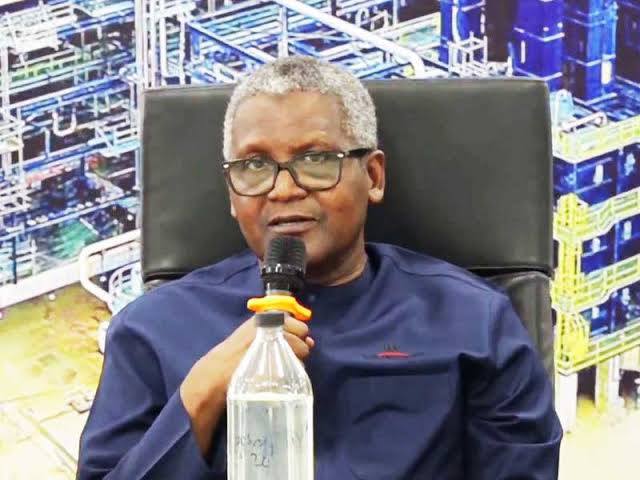The Dangote Petroleum Refinery’s new initiative to absorb nationwide fuel logistics costs has drawn widespread acclaim from energy experts, economists, and industry stakeholders.
Many describe the initiative as the most transformative intervention in Nigeria’s energy sector since Independence.
The ambitious programme, which involves the deployment of 4,000 Compressed Natural Gas (CNG)-powered trucks to deliver refined petroleum products across the country, is expected to save Nigerians over N1.7 trillion annually in logistics costs alone.
The company will bear an estimated N1.07 trillion annually in free fuel distribution costs.
According to the company, the trucks will begin direct deliveries of petrol and diesel from August 15 to filling stations, industrial consumers, and large-scale users nationwide, without any additional transportation charges.
Economist and CEO of Financial Derivatives Company, Bismarck Rewane, lauded the move, stating that it would lower production costs, ease inflationary pressures, and stimulate long-term economic growth.
He also dismissed concerns about the refinery becoming a monopoly, stressing that the existing inefficiencies in Nigeria’s energy logistics landscape are systemic.
“Dangote is delivering products at a uniform price nationwide by eliminating bridging costs and using cost-efficient CNG-powered trucks.
“This bypasses parasitic middlemen who add no value but inflate prices by extracting distribution margins,” Rewane said.
He added that the initiative would allow Dangote to offer credit facilities to retailers, further boosting access and affordability for small-scale operators across the country.
Kelvin Emmanuel, energy expert and co-founder of Dairy Hills, described Dangote’s decision to absorb logistics costs as a turning point in Nigeria’s journey toward enjoying the full benefits of local refining.
He noted that, for the first time, Nigerians may see pump prices reflect local efficiencies rather than imported inflation.
Another energy analyst, Ibukun Phillips, called the move “revolutionary” and predicted that it would significantly improve fuel affordability and access, particularly in rural and underserved communities.
“Rural dwellers, who usually pay more despite earning less, will benefit immensely. This could also bring life back to dormant filling stations and ensure more equitable distribution,” Phillips said.
The Independent Petroleum Marketers Association of Nigeria (IPMAN) also praised the initiative, describing it as a timely intervention that addresses long-standing bottlenecks in the downstream sector.
Chinedu Ukadike, IPMAN’s National Publicity Secretary, pointed out that many independent marketers have struggled due to non-functional pipelines and high transportation costs.
“We’ve had to depend on expensive road haulage from coastal depots due to the collapse of our pipeline infrastructure.
“Dangote’s intervention lifts a significant burden off marketers and will ease operations across the board,” Ukadike argued.
The Dangote Group is investing over N720 billion to roll out the CNG-powered truck fleet and establish nationwide CNG “mother and daughter” refuelling stations.
This is part of a broader strategy to enhance environmental sustainability, reduce reliance on diesel trucks, and create over 15,000 direct jobs across the logistics value chain, including drivers, station managers, and CNG technicians.
With Nigeria consuming an estimated 65 million litres of refined products daily, comprising 45 million litres of Premium Motor Spirit (PMS), 15 million litres of diesel, and 5 million litres of aviation fuel, the programme aims to ensure a stable, uninterrupted fuel supply across the nation.
In addition to lowering energy costs for households, the initiative is expected to have a significant impact on Micro, Small, and Medium Enterprises (MSMEs).
Over 42 million MSMEs stand to benefit from reduced operational expenses, thereby increasing their profitability and growth potential.
The company also believes the initiative will help curb the cross-border smuggling of petroleum products, as well as revive dormant filling stations and support economic activity in remote locations.
Beyond the economic benefits, the use of CNG vehicles is considered a strategic pivot towards greener, more sustainable logistics, aligning with global climate goals and reducing Nigeria’s carbon footprint.
“This is not just about free fuel delivery. It’s a complete overhaul of the downstream value chain, promoting efficiency, empowering businesses, and lifting millions of Nigerians out of energy poverty,” Dangote Refinery stated.
All rights reserved. The content on this website, including text and other digital materials, may not be reproduced, published, broadcast, rewritten, or redistributed, in whole or in part, without the express written consent of The News Accelerator Network.
For advertising inquiries, news coverage, or press releases, please get in touch with us at
📧 thenewsacceleratornetwork@gmail.com
📞 0805 101 7159, 0814 404 8512.


Post a Comment